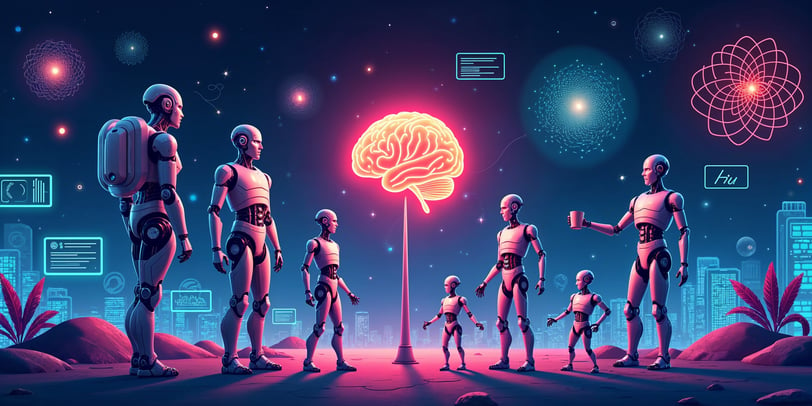The Evolution of AI: From Myths to Modern Marvels
Explore the fascinating journey of AI, from ancient myths to today's innovations. Discover how to use AI in business and its future impact.
BLOG


History of AI: From Concept to Reality
Artificial Intelligence (AI) has evolved from wild fantasies to a world-changing technology. From imagining robots taking over the world (thanks, sci-fi movies) to AI now being used in almost every industry, it’s been quite a journey. In this blog, we’ll take a deep, fun-filled look at AI's history, its setbacks, and how it has evolved into what it is today. Spoiler alert: robots aren’t taking over just yet, but you can still learn how to use artificial intelligence in your everyday life and business ventures!
(For a beginner’s guide, check out our article on AI for Beginners: What You Need to Know).
AI in Ancient Times: The Dream Begins
Mythological Origins of AI
Before AI became a science, it was a dream. Even in ancient myths like Talos, the mechanical being that protected people, humans showed an interest in creating "thinking" machines. It’s clear that even in the earliest civilizations, we were dreaming of AI-like tools. And now, we’re turning those dreams into reality, especially as more people wonder how to use AI in business and everyday tasks.
Read more: AI in Ancient Mythology: Fascination with Artificial Beings
The 1950s: AI Gets a Name
The Dartmouth Conference: AI’s Official Start
AI officially began in the 1950s when scientists like John McCarthy coined the term at the Dartmouth Conference. This was the launchpad for much of the AI research we see today, answering questions like how to use AI in business and how to integrate AI into modern industries.
For more on this topic, see: The Birth of Artificial Intelligence: Dartmouth Conference Highlights
Early AI Programs and Their Limitations
Early AI programs could solve problems and play chess but lacked the real learning capabilities we see today. As more industries and businesses began experimenting with AI, questions arose about how dangerous AI could be and how it could be used ethically.
The AI Winter: The Chill Period
Setbacks in AI Research
In the 1970s, the hype faded, and the field of AI entered an AI Winter. Scientists hit a wall, unable to make the AI systems as intelligent as they’d hoped. However, people never stopped dreaming about how to use artificial intelligence to improve industries like medicine, manufacturing, and marketing.
Check out: The AI Winter: A Freeze in Innovation?
The Rise of Expert Systems in the 1980s
In the 1980s, expert systems allowed AI to reemerge. While not as advanced as today's machine learning models, these systems showed potential, especially when it came to how businesses could use AI to make smarter decisions.
For more insights, see: Expert Systems in AI: Revolution or Rehash?
The Modern Era: AI Becomes Cool Again
Machine Learning and Data Revolution
AI got its second wind in the 2000s with the rise of machine learning. Instead of manually programming a machine, data could be fed to it, and the AI would learn on its own. This leap in how to use AI in business helped companies streamline tasks, predict consumer behavior, and optimize resources.
Interested in learning more? Read: Machine Learning Explained: How Data Powers AI
Deep Learning: The Power Behind AI Advancements
Deep learning further boosted AI’s potential by enabling it to recognize patterns, process natural language, and even generate content. This technology raised concerns for some on how dangerous AI is, but its vast potential continues to inspire new innovations.
Learn more: Deep Learning Demystified: What Sets It Apart?
AI Today: Your Phone’s Smart Friend
Everyday Applications of AI
Today, AI is everywhere, from Siri to Netflix recommendations. It’s helping businesses large and small. For those still asking, how to use AI in business, the answer is clear: AI is revolutionizing industries, from customer service chatbots to personalized shopping experiences.
Explore more: Everyday Uses of AI: Making Life Easier
How AI is Shaping Industries
AI is shaping industries like healthcare, finance, and e-commerce. Companies are constantly finding innovative ways to integrate AI, whether it’s automating tasks, analyzing data, or improving customer service. It's easy to see why more businesses are eager to understand how to use artificial intelligence to stay competitive.
Check out: AI in Healthcare and Finance: The Future of Industries
What’s Next: The Future of AI
Predictions for AI’s Development
The future of AI is bright, but many wonder how dangerous AI might become. Will it take over jobs or perhaps create new ones? AI has the power to transform industries and change the way we live, but ethical concerns must be addressed.
For more details, read: How AI Could Transform the Job Market
AI’s Role in Future Technologies
AI will play a major role in future technologies like quantum computing and blockchain. The next big questions for innovators will be: how to use AI responsibly and ethically while continuing to push the boundaries of what’s possible.
Discover more: AI and Quantum Computing: The Next Frontier
Wrapping Up: AI’s Incredible Journey
From ancient myths to today's technological marvels, AI has come a long way. Whether you’re figuring out how to use AI in business or considering how dangerous AI might become, there’s no doubt that artificial intelligence is here to stay. Let’s just hope it remains our helpful friend—and not our robot overlord!
Check out our other articles:
